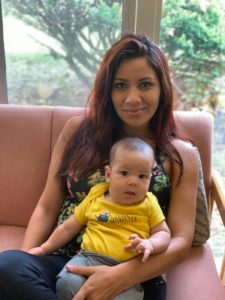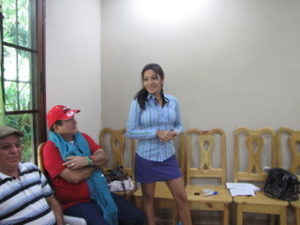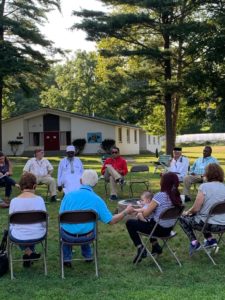Yeny Gloribel Nolasco Quijada | El Salvador
 “Our country needs young people like Yeny, young builders of peace, who have the courage to risk their lives for the ideal of seeing a society in which there is justice, solidarity, dedication to each other, love,” writes a Salvadoran police commissioner of the 31-year-old peacebuilder Yeny Quijada. It is sure that these words do not come lightly; Quijada’s resolve is tested in a daily wrestling match with threats of violence and death.
“Our country needs young people like Yeny, young builders of peace, who have the courage to risk their lives for the ideal of seeing a society in which there is justice, solidarity, dedication to each other, love,” writes a Salvadoran police commissioner of the 31-year-old peacebuilder Yeny Quijada. It is sure that these words do not come lightly; Quijada’s resolve is tested in a daily wrestling match with threats of violence and death.
El Salvador, where Quijada grew up and currently resides, bears a long history of civil and gang-related violent conflict. In a sequel to the bloody civil atrocities that unfolded from 1980 to 1992, organized crime has come blazing to the fore. Gangs like MS-13 and Barrio 18, whose roots reach back to Los Angeles, California, have emerged as major terrorizers, and employers, of metropolitan areas. Young men are often sucked up by these organizations in a vacuum of unemployment, while some young women find themselves coerced into sex work. MS-13 and Barrio 18 spare no bloodshed to enforce their policies, and unfortunately, the response of governments in the last decades has been marked by impotence and corruption.
Yeny Quijada has spent a large part of her adolescence and all her adulthood fighting the pull and dominance that criminal organizations exercise on her society. Her approach is preventive, in that she invests virtually all of her available resources and energy in providing alternatives (projects and peace activities) to young men and women instead of joining these violent circles that her society has developed in the later years.
 This work began at the age of 12 when Quijada led catechesis groups and altar boys, preaching the holy gospel with a focus on peace and environment to children and youth of her parish in San Salvador. Eventually, this effort and her mother’s influence led her to become a peacebuilder volunteer of the Asosiación Mesoamericana-Salvadoreña de Paz (AMESCOPAZ). At university, she became more aware of her country’s violent past as a tour guide at Monseñor Óscar Romero Center, an association that pays homage to the deeds of its titular archbishop, martyred during the civil war. At this center she learned about the lives of many men and women who died during and before the civil war, fighting for their rights and for the rights of people who didn’t have a voice, without recurring to violence. At the age of 19, she earned a salaried job as a peacebuilder (while still being a volunteer in AMESCOPAZ) of the Foundation for Sustainability and Peacemaking in Mesoamerica , but only after six years of work without remuneration. This led her to serve as the President of a conservation group that runs a marine turtle sanctuary.
This work began at the age of 12 when Quijada led catechesis groups and altar boys, preaching the holy gospel with a focus on peace and environment to children and youth of her parish in San Salvador. Eventually, this effort and her mother’s influence led her to become a peacebuilder volunteer of the Asosiación Mesoamericana-Salvadoreña de Paz (AMESCOPAZ). At university, she became more aware of her country’s violent past as a tour guide at Monseñor Óscar Romero Center, an association that pays homage to the deeds of its titular archbishop, martyred during the civil war. At this center she learned about the lives of many men and women who died during and before the civil war, fighting for their rights and for the rights of people who didn’t have a voice, without recurring to violence. At the age of 19, she earned a salaried job as a peacebuilder (while still being a volunteer in AMESCOPAZ) of the Foundation for Sustainability and Peacemaking in Mesoamerica , but only after six years of work without remuneration. This led her to serve as the President of a conservation group that runs a marine turtle sanctuary.
These days, Quijada marches on with her mission of providing alternatives to the youth and at-risk adults of El Salvador. In the later years she ran peacebuilding workshops, community theater productions, and training in organic farming. She invested a considerable amount of time meeting with police precincts, challenging them to reflect on their purpose, and for some, their tendency toward violent enforcement.
After receiving death threats from crime groups, Quijada was forced to move out of San Salvador. Quijada now works principally with young men and women fostering peace culture through organic farming, she has organized peace workshops in Honduras and Guatemala, engaging with indigenous Maya communities.
 Mayan spirituality accounts in part for Quijada’s commitment to the natural world. According to the Maya worldview, or “cosmovision,” Mother Earth plays a decisive role. As the mother of all living beings, she implores that her children live in peace, and that they might “walk always along open paths and walkways without ambush” (from the Popol Vuh). Thus, in the Maya cosmovision, peace and ecology are tantamount to one another.
Mayan spirituality accounts in part for Quijada’s commitment to the natural world. According to the Maya worldview, or “cosmovision,” Mother Earth plays a decisive role. As the mother of all living beings, she implores that her children live in peace, and that they might “walk always along open paths and walkways without ambush” (from the Popol Vuh). Thus, in the Maya cosmovision, peace and ecology are tantamount to one another.
To the likes of international and national NGOs, nonprofits, and donors, Yeny Quijada is, as one colleague put it, “a non-entity.” Quijada’s name appears seldom in reports, policy discussions, or checkbooks. And despite the lack of public recognition, she presses on with service “for [her] people and for God.” Tanenbaum is delighted to honor her as a Peacemaker in Action, to have her as part of the Peacemakers in Action Network, and to support her work. Nevertheless, one has the sense that were she not honored, recognized, or paid, Quijada would go on working from sunrise until sunset for Salvadorans for the rest of her living days.